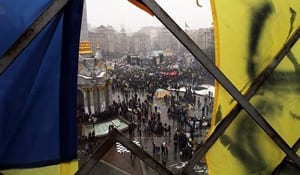Though headlines focus on the latest developments in Ukraine, the crisis has created a ripple effect around the world. The escalating conflict has even impacted events at the Baker Institute: An April 14 program featuring Børge Brende, Norway’s minister of foreign affairs, was postponed when he was asked to return to Oslo for meetings on the unfolding Ukraine-related crisis in Europe. Similarly, Georgiy Mamedov, Russia’s ambassador to Canada, cancelled an April 16 Baker Institute event on policy and politics in Russian-American relations.
We asked six Baker Institute fellows to explain how growing tensions in Ukraine have affected their areas of expertise, including international oil and gas trade, Syria, U.S.-Russia space policy, China, and the international economy.
 Ken Medlock, James A. Baker, III, and Susan G. Baker Fellow in Energy and Resource Economics and senior director of the Center for Energy Studies
Ken Medlock, James A. Baker, III, and Susan G. Baker Fellow in Energy and Resource Economics and senior director of the Center for Energy Studies
How is the situation in Ukraine affecting the international oil and gas trade?
It shouldn’t have much of an impact on oil trade unless there are multilateral sanctions, but don’t hold your breath. With regard to gas, the issue is different. Trade could be affected to the extent that the price breaks the Russians have given the Ukrainians are eliminated. Then you get into a situation of non-payment, and the Russians might then scale back supply. Then the Ukrainians can simply take gas off the line that is contractually bound for EU consumers farther west, as they did in the past pricing disputes.
 Jim Krane, Wallace S. Wilson Fellow in Energy Studies
Jim Krane, Wallace S. Wilson Fellow in Energy Studies
How will Moscow export gas to its European customers without relying on Ukrainian pipelines?
In 2009, Russia cut off gas delivery to Ukraine and Southeastern Europe for two weeks in the middle of winter. The cutoff triggered a huge uproar not only in Ukraine, but also in the rest of Europe. The EU immediately began seeking ways to increase energy security. For the most part, that meant reducing dependence on Russian supply. Governments responded by building LNG terminals, new pipelines and storage facilities that could insulate them from another Russian cutoff. Another Ukrainian supply breach would only enhance Russia’s reputation as a fickle supplier and as a state that uses blatant price tools and supply stoppages to push its political agenda.
Gazprom and the Russian political elite need to be careful. Cutting supply to Ukraine — even if flow is maintained by other means to the rest of Europe — would deepen Russia’s reputational damage. European importers would redouble their efforts to find alternate supply, perhaps even paying higher prices to avoid dependence on Russian gas. In the long run, a rash decision by Russia could trigger responses that would shift economies away from Russia, bringing lasting economic damage to the Russian economy.
 Andrew Bowen, Baker Institute scholar for the Middle East and director of the Levant Program
Andrew Bowen, Baker Institute scholar for the Middle East and director of the Levant Program
Can the U.S. and Russia still reach a compromise on Syria now that tensions are so high?
At the moment, Syria is not even on the agenda of the meetings between Secretary of State John Kerry and his Russian counterpart, Sergei Lavrov, with the possible exception of the chemical weapons issue. The Geneva talks are on hold indefinitely at this point. Until an agreement can be reached on Ukraine’s political and territorial future, U.S.-Russian cooperation is largely on hold on a number of important strategic issues, and the immediate focus is working out a deal on Ukraine. One cannot reasonably expect a deal on Syria when President Obama has imposed sanctions on senior Russian officials. For an already tense relationship, this crisis has deepened distrust and antipathy between both parties, and has substantially decreased any incentive for the Kremlin to find a compromise that could give President Obama a diplomatic win. For now, one has to wait and see how the situation in Ukraine develops and is resolved.
What other implications does the Ukraine crisis have for U.S. policy in the Middle East?
The largest crisis of Obama’s presidency — Iran’s nuclear program — may be affected by the situation in Ukraine. Moscow’s support was essential in securing the most recent agreement between the P5 + 1 and Iran, and reaching a final agreement with Iran is contingent even more on Russian support. President Putin could pull support from these talks in response to the United States’ position on Ukraine. Near to the end of his term, Obama could then face the prospects of once again trying to prevent a potential scenario where Israel pursues a pre-emptive strike against Iran’s nuclear program. In the cases of both Syria and Iran, President Obama runs the risk of the situation in Ukraine impacting negatively on his Middle East policy.
 George Abbey, Baker Botts Senior Fellow in Space Policy
George Abbey, Baker Botts Senior Fellow in Space Policy
NASA has suspended the majority of its cooperation and communication with its Russian counterpart over the Ukraine crisis. Will the ISS remain safe from political tensions?
The United States and their international partners on the International Space Station are completely dependent on Russia for human access to the station and to a rescue spacecraft during their six-month stays, as well as for their safe return to Earth upon the completion of their missions.
NASA’s suspension excludes ISS, so operations are continuing without interruption, and contacts between the station and Russian Mission Control and Houston’s Mission Control are unaffected. NASA’s pronouncement is, however, very unfortunate and shortsighted. It transforms human spaceflight — an outstanding example of international cooperation — into a political weapon. The two countries have worked together in space for over two decades with common goals and objectives in an exemplary fashion, above bilateral political considerations and differences. Safe operations on the ISS have to allow free and open interchanges between the engineers and operators from both countries. To instigate such limitations now is not wise and inhibits not only free and open communications, but could also create an atmosphere of mistrust in an environment where trust is essential to staying alive.
 Steven Lewis, C.V. Starr Transnational China Fellow
Steven Lewis, C.V. Starr Transnational China Fellow
How is the crisis in Ukraine shaping China’s long-term strategic interests in the region and its relationship with Russia?
Although publicly Chinese leaders will say little, they must be deeply concerned about Russia’s takeover of Crimea. One of their main national strategic concerns is to ensure the steady flow of natural gas to China in order to feed rapidly growing demand for energy and to clean up the pollution over Beijing and other cities by moving from coal to gas. Russia’s move in Crimea raises the question: Will Russia now intervene in all former Soviet republics with sizable Russian-speaking populations? If so, this potentially imperils the very large and expensive pipeline network China has built in Uzbekistan, Turkmenistan and Kazakhstan to move gas into Western China and on to Eastern and Southern China. This will undoubtedly complicate negotiations with Russia over pipeline gas from Siberia in to Northern China, planned to conclude this summer.
 Russell Green, Will Clayton Fellow in International Economics
Russell Green, Will Clayton Fellow in International Economics
What is the current situation for Ukraine’s economy?
The Ukrainian economy was stumbling before the Russian takeover of Crimea, even before the protests began in November. The IMF was still monitoring Ukraine after it finished a bailout package in December 2012 — and remember, the impetus for the protests was economics. Ukraine was looking for a trade deal to improve its growth path, and protests erupted when erstwhile President Viktor Yanukovych rejected a deal with the EU in favor of one with Russia. The economy is now in tatters, as one would expect when civil protests and martial conditions disrupt what was an already weak economy. It has avoided total collapse only through new lifelines from the IMF and Western aid packages.
How could the political and economic instability affect Ukraine’s potential accession bid to the EU?
The protests that ousted Yanukovych appear to have succeeded in turning the country (or at least those parts still under the control of the central government) back toward the EU. Presumably any interest in closer alignment with Russia — which had restrained enthusiasm for the EU in the past — has been permanently extinguished. The EU has desired closer trade ties with Ukraine for a while. This has not gone to the extent of talking about EU membership, but overtures to help Ukraine through the crisis will inevitably bring the two sides closer.
